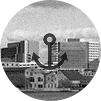Brands are People, Too
A lot of people are confused by brands. They get it confused with a brand mark.
Actually, brands are like friends. In fact, we often refer to them AS people, almost. Brands have personalities, for example.
We’ve found that beer is the easiest way to explain this. You’re at a bar. Someone who eyes you from across the bar has to figure out what kind of person you are, without speaking to you. How do they do it?
One way might be to look at the friends you hang with. If you’re surrounded by jocks, you’re a jock. If your friends look laid-back, you’re laid-back. If you’re surrounded by people with horn-rimmed glasses and tweed jackets, we’re not sure what you’re doing in that bar. (We joke.)
Now, let’s say someone is drinking at the bar alone. They’re still hanging with a friend — the beer they hold in their hands. Let’s say we’ve got two identical twins. One is drinking a Budweiser. One is drinking a Michelob ULTRA. If you’re a fitness buff, which twin do you approach first?
Clearly, brands say something about you — and you choose to associate with the ones that say the right things, the same way you would if you were hanging with friends. You might even switch your brand to fit in — ordering a Budweiser at a blue-collar bar, for example, or a Michelob ULTRA when surrounded by the beautiful people.
The process we’ve just described is what we call branding. We ascribe an emotional meaning to that name on your beer, the symbol on your shirt, the nameplate on your car, or whatever.
Incidentally, this process works in reverse. People themselves are brands, and products pay thousands of dollars — or even millions — hoping to gain identification through association with these people. That’s the value of a celebrity endorsement.




